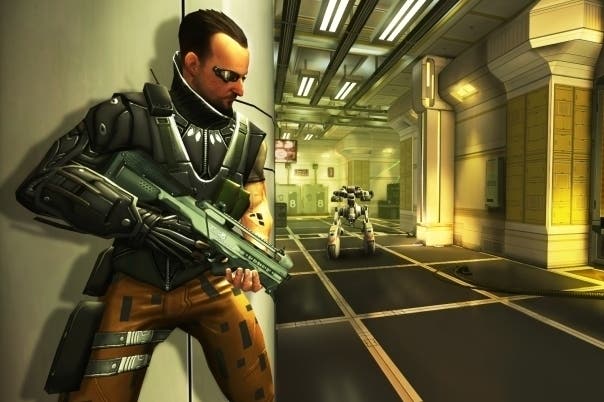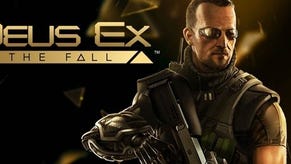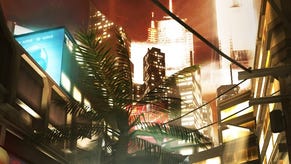Deus Ex: The Fall review
The iCarus Effect.
Calm any fears that Deus Ex: The Fall is a cheaply realised iOS side story that doesn't amount to very much. In truth, it's an expensively realised iOS side story that still doesn't amount to very much.
It feels almost ungrateful to be disappointed, really. Whether it was a smart approach or not, N-Fusion's done a laudably thorough job of cramming the entire Deux Ex shebang onto a touch-screen, from the relatively sprawling hub (this time it's Panama City) to the knotty storyline of PMCs, personal betrayal and Big Pharma corruption. There are main missions and side quests, there are people to talk to, there are decisions to make, emails to read, weapons to upgrade and Praxis points to spend. The 3D world is atmospheric and filled with detail, and the whole thing's stained by that rich Human Evolution amber. Even a suite of in-app purchases turn out to be entirely optional - XP boosts and in-game currency packs that you can happily ignore.
The more you play, however, the more problems start to mount up. They're simple problems, perhaps, but as any Deus Ex veteran knows, the most elaborate plan can always be compromised by the most basic of components.
Not the absolute most basic of components, though. If nothing else, The Fall initially feels like something of a victory for complex touch-screen design. Playing out in first-person, you're offered two control schemes to choose between. One allows you to tap the environment to select a point to move to, and a second divides the screen down the middle, letting you walk with one thumb and look about with the other. Ultimately, you'll want to settle for a mix of both systems, sticking yourself to walls or desks with the former and doing most of your actual exploring with the latter, but this muddled approach does the job well nonetheless. Weapons, gadgets, augmentations and consumables are all available via drop-down menus and selected with a quick prod, movement from one piece of cover to the next is handled with no-fuss icon buttons, and you can even lock onto enemies with a stab of your finger.
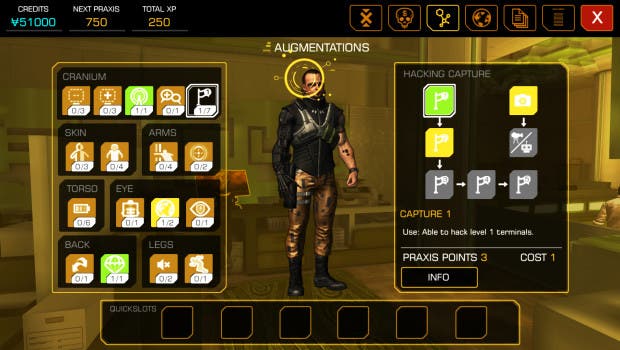
Those enemies, though, are where things start to creak. Character models are both simplistic and ruthlessly repeated, which is probably to be expected, but they're also shackled to awkward, rather elderly animations and weak hit responses. Whether you opt to gun everyone down or to stick to the shadows, you'll find that your foes are aggressively stupid, too. I'm not sure if it's a bug that currently sees many of them unwilling to trade further fire after they've let go with a first shot or two, but even beyond that, you'll see weird behaviour patterns everywhere you look - guards that race right past you and then stand, face pressed up against a nearby wall, while you pick them off at your leisure, and their colleagues, who lose track of you and then wander away even as you're crouched immediately in front of them.
Bland weapons that deal unpredictable damage don't help. Sometimes a long-distance headshot with a handgun will bring down a rentacop in one blast. Sometimes, though, the same cop will take three or four bullets to their (unarmoured) cranium without looking even the slightest bit unwell. But this is Deus Ex, right? Shouldn't the focus be on sneaking around? Opt for a quieter approach and you'll find that while the cover system works beautifully in all but the most panicked of situations, maps tend to be small, and optional routes are uninspiring. There are environmental hurdles like electrified floors and locked doors in need of hacking, but opportunities to really have fun with the level design are few and far between.
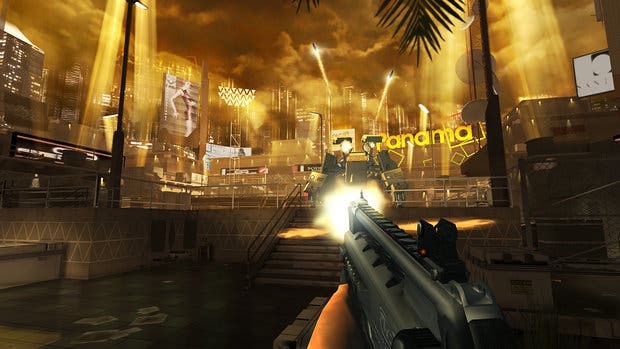
Elsewhere, the annoyances continue to pile up. A handful of crash bugs aside, this isn't a bad game most of the time; it just doesn't provide much genuine pleasure over its four or five hours of running time. The central hub is characterless and splintered across a series of cluttered areas ripe for endless backtracking. The narrative is ultimately predictable and dull, the voice acting is horribly stagey and Ben Saxon, the new protagonist, is every gruff English idiot you've ever encountered in a direct-to-DVD guys-on-a-mission movie, except this time he appears to have taken visual cues from late-era Ringo Starr. Praxis points, meanwhile, tie you into an augmentation system that offers only the blandest of upgrades - improved hacking, silent movement and better armour are some of the more interesting options, which is telling. By the time you're reading the inevitable, "To be continued..." message at the end, you may be left with the question of whether any of N-Fusion's obvious hard work was really worth it.
On paper, this is just the kind of iOS tie-in fans often ask for: it's faithful to the source material, filled with familiar systems and details, and it's even made a decent attempt at matching the graphical style of the main game. It's Deus Ex in cross-section, but although so many of the right pieces are in place, the energy and skill that usually brings the whole thing to life is missing. Regardless of whether you believe Deus Ex's basic genome should have adapted a little more for its new platform in the first place, there's no debating the fact that any sequel will require some serious augmentation.
